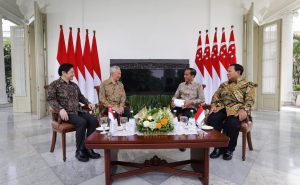The leaders of Singapore and Indonesia have pledged to maintain continuity in their bilateral relations as both prepare to hand the reins of power to new leaders later this year.
Speaking after their final Leaders’ Retreat in Jakarta yesterday, Prime Minister Lee Hsien Loong and Indonesian President Joko “Jokowi” Widodo celebrated how far relations had developed during their respective tenures: Lee’s since 2004, and Jokowi’s since 2014.
“While this retreat is a fitting occasion to reflect and celebrate what we have achieved together, it is also about continuity and looking ahead,” Lee told the press after the meeting, according to a report by Channel News Asia. He expressed confidence that he and Jokowi were leaving the bilateral relationship in a good state for their successors.
To underscore the theme of continuity, Lee and Jokowi were accompanied by their successors: Deputy Prime Minister Lawrence Wong, who will take over Singapore’s prime ministership next month, and Prabowo Subianto, currently Indonesia’s defense minister, who will take office in October. In a social media post, Wong described the meeting as a “unique opportunity” for the two leaders and their successors to meet.
“I look forward to working with president-elect Prabowo to build on the strong ties, and to take our partnership to greater heights,” he wrote.
With all due recognition of the rhetorical inflation that usually attends such summits, it is true that the stability of the Lee-Jokowi era has been good for relations between Indonesia and Singapore, which have had their moments of turbulence, to say the least.
At the Leaders’ Retreat in Bintan in January 2022, the two countries signed three important agreements, collectively known as the Expanded Framework, which included a Defense Cooperation Agreement (DCA), and treaties relating to extradition and air space management. After ratification, the three agreements entered into force in March of this year, when Lee described them as a “major milestone” and a sign of the “strength and maturity” of the bilateral relationship.
The most significant of these was without a doubt the defense component. The DCA will enhance Singapore’s right to carry out naval and military exercises in Indonesian territory, something that is vital due to its own lack of space on land, air, and sea. Specifically, Indonesia has agreed to let Singapore carry out naval exercises with other nations in the South China Sea four times a year.
This has long been a sensitive subject in Indonesia, where politicians remain highly sensitive to any perceived slight on its sovereignty, and suspicions of Singapore have simmered since even before the establishment of diplomatic relations in 1967. While the Singapore Armed Forces were first granted the right to train in Indonesia’s archipelagic waters in 1995, Jakarta ended the arrangement in 2003, expressing concerns that Singapore had overstepped the bounds of the pact. Even after the DCA was signed in 2007, Indonesia’s Parliament refused to ratify it due to some lawmakers’ concerns about maritime sovereignty.
Overcoming this hurdle was, therefore, no small feat, and marked a significant step forward in bilateral relations, as was the fact that Indonesia’s parliament quickly ratified the agreement at the end of 2022. Rizka Darmawan, a lecturer in International Law and researcher at the Centre for Sustainable Ocean Policy at Universitas Indonesia, argued that it “underscores growing strategic trust between two neighboring countries with different geographical conditions and foreign policy interests.”
At this year’s retreat, the two leaders witnessed the signing of an update to the DCA, and a separate agreement on environmental sustainability. Lee and Jokowi also announced the launch of a pilot of a bilateral labor program, known as Tech:X, which will allow young tech professionals from Indonesia and Singapore to pursue short-term periods of work in the other country.
Given the fraught history between Singapore and Indonesia, suspicions and disagreements will no doubt continue to shadow the relationship in the years to come – but after a decade of stability and progress under Lee and Jokowi, conditions could hardly be more propitious for their successors.

































